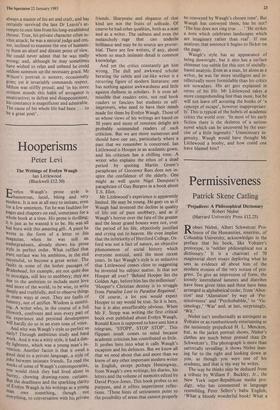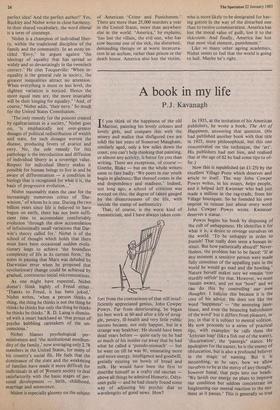Permissiveness
Patrick Skene Catling
Prejudices: A Philosophical Dictionary Robert Nisbet (Harvard University Press £12.25)
Robert Nisbet, Albert Schweitzer Pro- fessor of the Humanities, emeritus, of Columbia University, acknowledges in the preface that his book, like Voltaire's prototype, is `neither philosophical nor a dictionary.' It is a charivari of 70 magisterial short essays deploring what he sees as evidence all about him of the modern erosion of the very notion of pro- gress. To give an impression of form, the loosely interrelated laments and diatribes have been given titles and these have been arranged in alphabetical order, from `Abor- tion' and 'Alienation' by way of `Per- missiveness' and `Psychobabble,' to `Vic- timology,"War' and, at last, surprisingly, `Wit.'
Nisbet isn't intellectually as astringent as Voltaire or as rumbustiously entertaining as the insistently prejudiced H. L. Mencken, but, as the jacket portrait shows, Nisbet's clothes are much better pressed than Dr Schweitzer's. The photograph is more than sartorially revealing: it shows Nisbet lean- ing far to the right and looking down at you, as though you were one of his students, and that is the way he writes.
The way he thinks may be deduced from a tribute by William F. Buckley, Jr., the New York super-Republican media pro- digy, who has commented in language resembling Peter Sellers's babu English, `What a bloody wonderful book! What a
perfect idea! And the perfect author!' Yes, Buckley and Nisbet write in close harmony. In their shared vocabulary, the word liberal is a term of contempt.
Nisbet is a champion of individual liber- ty, within the traditional discipline of the family and the community. In an essay en- titled . 'Envy,' he argues against 'the ideology of equality that has spread so widely and so devastatingly in the twentieth century.' He cites Tocqueville: 'When in- equality is the general rule in society, the greatest inequalities attract no attention. When everything is more or less level, the slightest variation is noticed. Hence the more equal men are, the more insatiable will be their longing for equality."And, of course,' Nisbet adds, 'their envy.' So much for the United States Constitution.
'The only remedy for the poisons created by egalitarianism in a society,' Nisbet goes on, 'is emphatically not ever-greater dosages of political redistribution of wealth and state, for such dosages worsen the disease, producing fevers of avarice and envy. No, the sole remedy for this pathology is the introduction and diffusion of individual liberty as a sovereign value. Respect for individual liberty makes it possible for human beings to live in and be aware of differentiation — a condition in biology that is recognised for what it is, the basis of progressive evolution...'
Nisbet reasonably states the case for the increasingly numerous critics of 'Dar- winism,' of whom he is one. During the two billion years since life is believed to have begun on earth, there has not been suffi- cient time to accomodate comfortably evolution 'through the slow accumulation of infinitesimally small variations that Dar- win's theory called for.' Nisbet is of the school of thought which holds that there must have been occasional sudden evolu- tionary leaps to achieve 'the boundless complexity of life in its current form.' He notes in passing that Marx was deluded by Darwinian error when he proposed that revolutionary change could be achieved by gradual, continuous social micromutations.
As one might have expected, Nisbet doesn't think highly of Freud either. `Thanks to Freud, it has been joked,' Nisbet writes, 'when a person thinks a thing, the thing he thinks is not the thing he thinks he thinks but only the thing he thinks he thinks he thinks.' R. D. Laing is dismiss- ed with a smart backhand as 'that prince of psycho babbling caretakers of the un- conscious.'
Nisbet blames psychological per- missiveness and 'the institutional moribun- dity of the family,' now averaging only 2.78 members in the United States, for many of his country's social ills. He feels that the dominance of the state and the weakening of families have made it more difficult for individuals in all of Western society to deal satisfactorily with the basic stages of per- sonal development — birth, childhood, marriage and senescence.
Nisbet is especially gloomy on the subject of American 'Crime and Punishment.' There are more than 25,000 murders a year in the United States, more than anywhere else in the world. 'America,' he explains, 'has lost the villain, the evil one, who has now become one of the sick, the disturbed, demanding therapy or at worst incarcera- tion in an asylum, rather than prison or the death house. America also lost the victim, who is more likely to be denigrated for hav- ing gotten in the way of the disturbed one than to receive commiseration. America has lost the moral value of guilt, lost it to the sickroom. And finally, America has lost that most vital element, punishment.'
Like so many other ageing academics, Nisbet seems to feel that the world is going to hell. Maybe he's right.







































 Previous page
Previous page